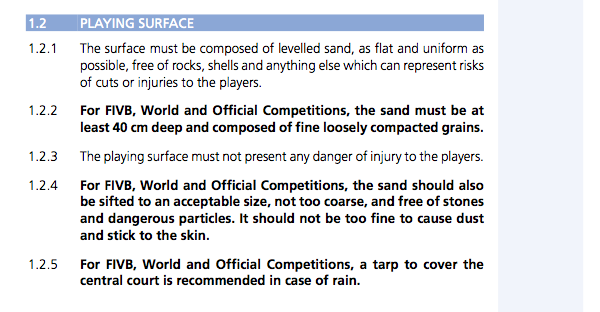Spiking the Sand
Beach volleyball has been an official Olympic sport since 1996, debuting four years earlier as a demonstration sport. The United States and Brazil have dominated the sport in its five appearances to date, taking eight of ten golds (four each in both the men’s and women’s contests) and twenty of the 30 medals overall. In the last three games — 2004 in Athens, 2008 in Beijing, and 2012 in London — Americans Misty May-Treanor and Kerri Walsh Jennings walked off the beach decorated in gold medals.
But, interestingly, they weren’t covered in sand.
If you’ve ever been to the beach, you know that this can’t be possible. Sand gets everywhere — in your shoes, in your food, and in your stuff and on your body generally. That’s because dry sand, if the grains are small enough, adheres to anything wet — including the sweat we naturally release when vacationing on the beach. And, yes, beach volleyball players sweat just like the rest of us (okay, maybe a little less). And they’re out in the sun, on the beach, for hours at a time. Therefore, one would expect that beach volleyball players would be speckled in beige from head to toe, but rather, they look like this. There may be a grain of sand here or there, but if you’re watching on TV or checking out some high-res images later, you’d hardly notice.
The reason: special sand, sourced and filtered for just this purpose. The International Volleyball Federation has strict rules regarding the quality of beach volleyball sand — it has to be free of shells and stones, for example. But that’s mostly for the safety of the players, as one wouldn’t want a jagged edge or hard landing causing an injury, especially not when fans around the globe are watching. But the Federation goes above and beyond that, checking to make sure that the sand is neither too large nor too small. Yahoo called it “Goldilocks style.” It has to be just right — the grains have to be small enough so that the sand is safe and comfortable, but large enough so that they do not stick. The Federation’s rules are below (via this pdf):

Which often means that the Olympic organizers have to import sand. According to Reuters, for the Beijing Games, that meant shipping in 17,000 tons of white sand from Hainan Island, the main island of the Chinese province of the same name — it’s a trip of over 1,500 miles (2,500 km). Hainan Island has a meaningful tourism business due to its tropical beaches but it is still emerging, so the sand found there is generally undisturbed nor influenced by outsiders, leaving it soft. So in the case of the Olympics, the fact that few from the mainland had come to the beaches meant that the beaches could come to the mainland for the Games. Reuters further explained:
The luxuriously soft sand was shoveled into bags on the palm-fringed beaches of Hainan, nicknamed “China’s Hawaii” despite being far less developed as a tourist centre than its U.S. namesake.
It was then shipped from China’s island province to Tian Jin, piled on to trucks, driven to Beijing and tipped out in the Chaoyang stadium and practice courts, where it is hosed and raked regularly to keep it from packing down too densely.
The sand, therefore, wasn’t likely to have too much of an effect on the in-game play — or mess up the TV picture quality, either.
Bonus Fact: Starting in 1995, the Broadcast Film Critics Association began awarding honors to the top films, actors, directors, and others who help make movies that come to the theaters. In 2001 (honoring films released in 2000), the Association named Cast Away, starring Tom Hanks and an actual, inanimate volleyball named Wilson, as one of the top 10 movies of the year. Cast Away was also given one other honor — Wilson won “Best Inanimate Object.” It was the debut appearance for the category and, for that matter, the final one to date as well.
From the Archives: Exit Sandman: When some criminals stole a beach.
Take the Quiz: Name the winners of these discontinued Olympic events.
Related: Brookstone’s Sand, with two horizontal dots over the “a.” It’s pretty amazing — it sticks when you want it to but doesn’t when you don’t, and the only explanation is some sort of weird sorcery.
